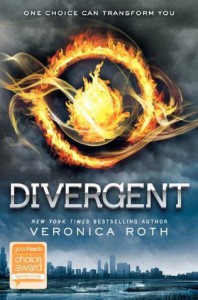Scavenging Book Stores and Libraries
Currently I'm a librarian and before that I was an archaeologist, a journalist, and definitely a bit of a world traveler. I tend to mostly read science fiction and fantasy, though I do love a good mystery and I'm a bit of a book dabbler overall. I've been doing Goodreads for awhile, but a friend thought I might enjoy this as well. Let's see, yeah?
Diverging Opinion

I had a difficult time getting into this book, but I'm glad I pushed through the first few chapters until I got to the much more satisfying meat of the story. There was something about the world building at the beginning of the novel that just didn't work for me. This is kind of strange for me, because I usually adore exploring new worlds or societies, but this one... Perhaps it just felt too much like window dressing for me. The factioned society was interesting, but I couldn't see enough of why things would be this way and why people would believe that they were so fully one trait and none of the others. Surely it would be obvious that we are all mixtures of many traits -- and traits that go far beyond just these random seeming five.
This setup would have worked for me if this were a more of a whimsical, allegorical novel -- something like Flatland or Candide. With a bit of silliness thrown in and some blatant symbolism, we can breeze past world-building and understand that we will only see what is useful to the message of the book. However, Divergent is NOT that kind of book...
So... Why was it these five factions? And why did they manifest in the way that they did? At first blush it seems like we have the Pushovers, the Sociopathic Thrillseekers, the Cult of TMI, the Coldest of Intellectuals, and the Don't Worry, Be Happy Crowd. And people are happy with this and it somehow creates a happy, healthy society? How does such a brief brain test by apparently common labor determine people so fully who people are?
However, eventually we get past all that and we start learning much more about who Tris is and how she faces the world. She is an admirable individual and I want good things to happen to her. Her actions are a lot more logical than her world and I start to suspect (or maybe hope) that the world building isn't sketchy, so much as foreshadowingly broken? My only real gripe after the book gets going is one character's well nigh invisble slide into utter insanity... He deserved better than that.
I'm interested to see where the series goes and to find out what happens to Tris and the people she cares about. I'm assuming the latter books will be more easy for me to get into since the setup already appeared in book one.
I guess after spending so much time on why I didn't like the beginning of the book, I need to spend more time convincing you the rest is worth reading, huh? I guess what I enjoy most is the view into the way Tris reacts to the world. The first person viewpoint sometimes gets in the way of this a little bit, but overall her personality shines through and you can start to predict, little by little, how she will react to things. This is good, because she feels like a real person (a very special, skilled person, but real, nonetheless). Her secondary character, Four, also brings a lot of interest to the story because as the readers, we can see that he knows much more than he's letting on and we can understand his motivations much better than Tris can.
The camaraderie of the Faction is great to seem, when it's allowed to show through, and the callousness from the other side of the coin is very chilling. The world-building, when in the close quarters of one base, is much better here.
 3
3






